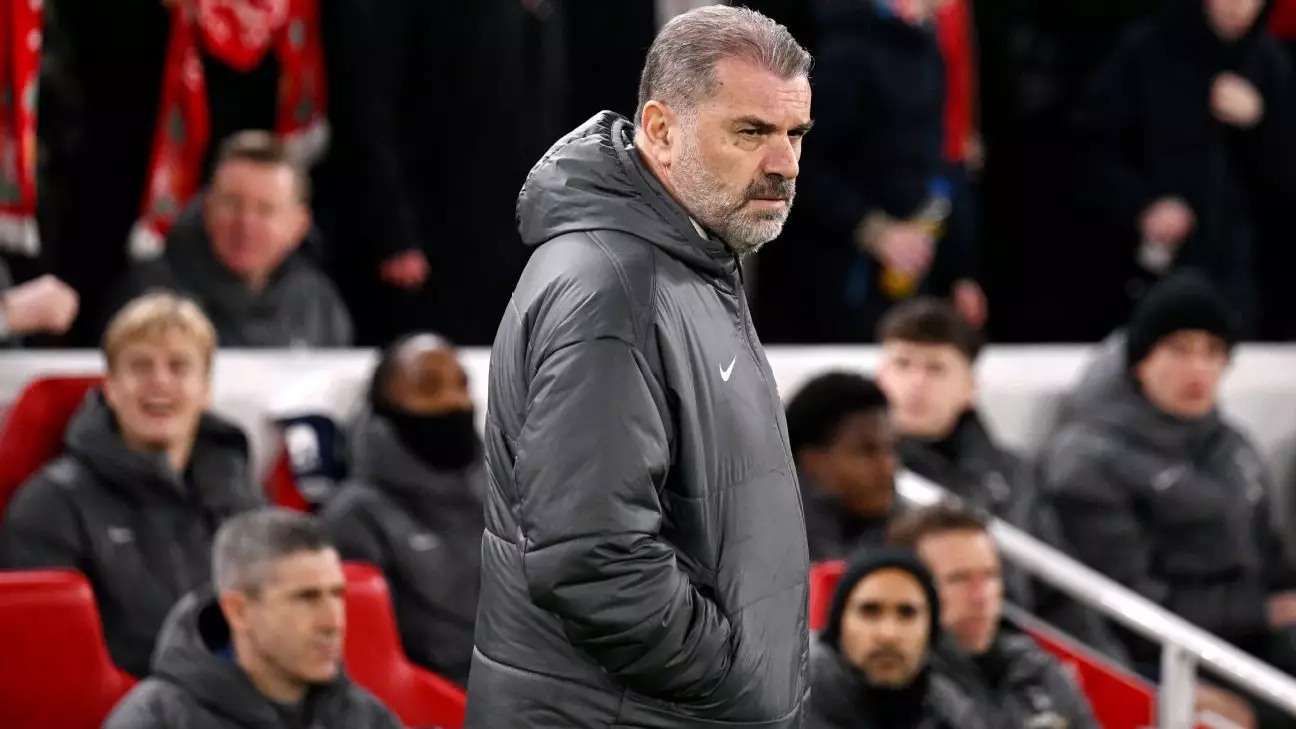Tottenham Hotspur head coach Ange Postecoglou finds himself in tumultuous waters after his squad suffered a disheartening 4-0 defeat to Liverpool in a critical Carabao Cup semifinal. This dismantling at Anfield serves not only as a painful reminder of the challenges facing the team but also underlines the broader issues that have plagued Spurs in recent months. Following a promising 1-0 lead from the first leg, the emphatic nature of this loss raised eyebrows, leading to waves of criticism directed towards both the players and the coaching staff.
Postecoglou’s response was telling; he acknowledged the ease with which critics have been able to “stick their boots” into his misfiring side. Such sentiments highlight the growing frustration amongst supporters and pundits alike regarding the club’s inconsistency. Jamie Redknapp, a significant voice in football commentary and a former Spurs captain, highlighted the grim reading the scoreline produced, further amplifying the scrutiny surrounding the team’s performances.
Adding to the challenges, the injury crisis within the Tottenham squad has reached staggering levels. The latest casualty, Richarlison, suffered an emotional setback during the Liverpool match, marking yet another significant name added to the club’s lengthy injury list. Postecoglou’s comments underscore the frustration permeating the squad; not only are they batting with poor results, but they are also grappling with absent key players.
It is essential to note the depth of the injuries impacting the team. With players like Guglielmo Vicario, Cristian Romero, and James Maddison out of action, Postecoglou’s tactical flexibility is severely constrained. This unfortunate situation raises questions about the club’s fitness and conditioning programs, leading to an obvious inquiry: why is there such a high injury toll within the team? Injuries are part and parcel of professional sports, yet the alarming frequency at which Spurs players have been affected demands scrutiny.
Despite the storm clouds gathered overhead, Postecoglou remains optimistic. He hinted at potential returns of several key players for their upcoming Premier League clash against Manchester United, emphasizing his belief in the strength of their collective resolve. Herein lies the paradox of managing a team: the dual need to maintain morale while fortifying a well-nurtured sense of realism given the existing circumstances.
Analyzing the manager’s approach, it becomes apparent that Postecoglou is working against the tide of expectations. Spurs have not garnered a trophy since their Carabao Cup win in 2008, and unless significant improvements transform the current season, they risk further cementing a narrative of underachievement. An optimistic outlook without pragmatic strategy may result in disillusionment among fans, who have long yearned for their team’s return to glory.
Dire situations demand strategic reassessment, especially with another opportunity for silverware in the form of the FA Cup now at hand. Postecoglou expressed confidence that the team can showcase their potential in the FA Cup tie against Aston Villa. The focus, he insists, must redirect towards building a performance that reflects their true capabilities and recent efforts in training.
For a club with ambitions to rise within both domestic and European contexts, this upcoming match serves as a pivotal moment. The intersection of tactical adjustments and mental resilience must converge if Spurs are to progress past Villa and revitalize a season teetering on the brink.
Tottenham Hotspur, under Ange Postecoglou, currently finds itself grappling with a blend of disillusionment and injury woes. With pressure mounting from all quarters, addressing both player fitness and tactical efficacy will be paramount. Only through a concerted effort can Spurs hope to reshape their narrative and bring home a long-awaited trophy to their fans.

